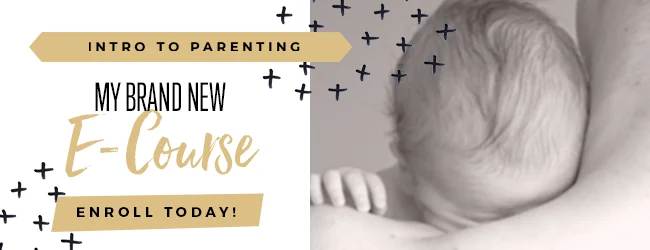Sleep Training 101: How to help your infant sleep well
QUICK CHECK-IN >> Did you come here looking for my infamous(ly) awesome 25 Sleep Tips eMag? Then click here and get started. This blog post is made to be a companion piece so that when you have both, you'll be a sleep wizard with ninja skills.
Do you know that Beatles song, “Help!”? The tune is so iconic, the words are so catchy, and my husband is a huge fan. Ok. So, fast forward to the long months after my son was born and I wasn’t sleeping...
I had yet to discover that all the dairy in my breastmilk was giving him serious discomfort and the source of some MAJOR sleep disturbance. As in….I didn’t sleep for more than two hours at a time for 9 months. I remember pacing around the nursery at 12 am, 2 am, 4 am, singing to the tune of Help!
"Sleep! I need somebody.
Sleep! Not just anybody.
Sleep! You know I need someone.
Sleeeeeeeeep…"
Been there? Nevermind that it took me 9 months and some major moolah on sleep specialists to figure out that my kid was hurting, and that that would have to resolve before I could start working on the poor sleep habits that had developed….I still cringe when I think about that fact - yowzas.
Sleep deprivation is nothing to joke about.
I have been there. All of my training and the hours in long, fruitful conversations with many of America’s best infant sleep specialists, did NOT prepare me for it. I had a kid that didn’t get the sleep he needed while I teetered dangerously on the edge of breakdown.
“Sleep! I need somebody.
Sleep! Not just anybody.
Sleep! You know I need someone.
Sleeeeeeeeep…”
I don’t want anyone to suffer in this way, especially when I am one hundred percent certain that an overwhelming majority of infant sleep problems can EASILY be prevented. Even my sleep problems could have been prevented had I known about his protein allergy.
In the end, it took a compassionate expert at Manhattan’s famous Upper East Side Sleep Dream Team to ask me, “Have you tried an elimination diet to see if things improve?”
And with that, my solution began. It was a gracious question that both came too late and at just the right time.
This post is for the mamas and the papas out there that want to make sure that they never find themselves in the position of having to “sleep train.” If you want to hear more about how I actually resolved our sleep problems through sleep training and remedial intervention (perhaps because you’re in that dark, teetering place already) then click here.
>>HOW TO WORK THROUGH YOUR CHILD'S SLEEP PROBLEMS<<
If you’re not in the dark place, I recommend pinning that post anyway, because knowing sleep training basics will help with naps, etc when the time comes.
Where the intervention and “fixes” are kind of complicated and typically excruciating for parents, the prevention is relatively simple and pain free. This post is all about prevention. If you want to go deeper into the value of sleep and explore more fully the preventative steps - I recommend taking my Intro to Parenting course.
WHAT YOU NEED TO KNOW TO PREVENT SLEEP PROBLEMS:
There is a lot to know about infant sleep, but I believe that much of it can be taught through simple techniques that have “prevention” as their goal.
I made the Infant Sleep Guide which you can download here or by clicking the image above to relay a MASSIVE amount of tricks and tips to help you and your baby sleep well. This thing is NO JOKE...This blog post is an awesome compliment to those tips.....so lets get to it
As was our case, sometimes sleep problems are derivative and develop because you have other medical issues that need to be eliminated. But if medical problems aren’t your circumstance then these tips will be easy preventatives.
>> SLEEP BEGETS SLEEP
The more a baby sleeps, the more a baby sleeps. That is cold hard science. Get a newborn to sleep well and regularly during the day, and they will sleep well at night. Sleeping is a skill, and even if they are working on it during the day, they are still working on it. That matters.
A lot of parents see their newborn sleeping during the day and think that they need to wake him up so that he doesn’t get his days and night confused or so that he will sleep at night. Day and night confusion is normal and mostly a response to the babies developing brain and endocrine system. The best thing you can do is sleep when they sleep, even if it is during the day.
The only reason you should wake a baby during the day is to EAT.
>> BABIES NEED TO EAT
The rumor that babies who sleep a ton during the day don’t sleep at night, is probably based in real experience. But the parents who are experiencing this reality are making the wrong attributions about the cause of the problem.
Parents notice their baby sleeps less at night if they sleep more during the day and assume it is because their newborn is getting so rested in the AM that they aren’t snoozing in the PM. Hmmmmm.
The more likely reason that parents have this experience is because their baby is sleeping through times when he should be eating, and that is the real disruption.
It helps to understand how babies take in calories. Babies need a certain amount of calories in a 24 hour period - and they will fight for them. It’s survival. If they don’t get those calories in the first 12 hrs when they should be eating, then they will get them in the second 12 hours when they should be sleeping.
So if your baby is doing such a good job consolidating sleep cycles that he is sleeping 4-5 hours during the day and missing an entire meal - you better believe he is going to get that meal later in the night. Babies don’t miss meals….they just move them.
In the beginning there is only so much you can do. The baby has a small stomach, might be very drowsy at the breast or bottle, might not be an efficient eater, or the milk supply may be sparse. But as the baby ages, try and give him or her big + long feedings during the day that empty at least one breast each time. That hindmilk is where the calories are, and you want to maximize your baby’s caloric intake during the day so that they wont demand them at night.
If you are already wondering about your child’s sleep habits and thinking they might have bad habits, start by being super intentional about jamming all their ounces and calories during times when they should be awake.
Even if that means you are feeding them every two hours - do it. You won’t regret it and your baby will actually learn to sleep more quickly and spread his meals out with less complaining and disruption than if you were to stick to a rigid 4 hour schedule right from the start. Newborns who feed on demand during the day sleep better at night.
>> MIND SLEEP ASSOCIATIONS
I think that the reason seriously questionable baby methods like Baby Wise have as much success as they do is because they accidentally get parents in the habit of avoiding sleep associations. Sleep associations are essentially crutches that your baby uses to help himself fall back asleep.
So, if your baby needs you to be rocking her to fall asleep, then at the end of every 45 minute sleep cycle, they will be calling you to come help them fall back asleep. Pacis/sucking, rocking, singing, patting on the back - all of these are sleep associations that demand the help of someone else, and will eventually be problematic.
Comforting your baby by doing these things is wonderful, but before you place your baby in the crib, allow them to stir or wake a bit so that they can have the experience of putting themselves to sleep or initiate a sleep cycle by themselves. You will never regret spending the first several months of your child’s life being sure to put them to bed in a sleepy and satisfied, yet awake state. That little habit has huge dividends for their and your sleep.
>> UNDERSTAND BABY SLEEP CYCLES
We all have to learn the very important task of consolidating sleep. By this I mean that the average sleep cycle for all of us is about 45 minutes. Even now, you come to the top of your sleep cycle, stir or even wake, and then go right back to sleep. You don’t remember it because you don’t have a sleep crutch and because you have already conquered the consolidation skill.
When we give our children sleep associations, we essentially hurt their chances of learning this skill quickly and thus deprive them of the satisfying experience of patching several cycles together. Can you imagine if you still had a sleep association and needed someone to come pat you on the back every 45 minutes? It would be miserable.
Sleep is one of the first and one of the most important skills a baby has to learn, right after digesting. You can help them learn this very important skill by putting them to bed awake, sleepy, and satisfied, by trust that they can do it, and by being very careful about sleep associations.
More than the pain of crying for a few moments between sleep cycles, not being able to consolidate sleep can be a lifelong and chronic problem that will hurt them for years and years. Babies who experience this frustration early, and even have sleep training experiences, actually cry less and are more satisfied (as indicated by their soothability, agitation, overwhelm, and responsively) than babies who don't.
>> PRACTICE THE PAUSE
Ok. This one is huge. HUGE. Do not go to your baby every time they stir or make noise. Again, your newborn is working hard to learn one of their most critical skills: sleep. When they finish a sleep cycle, you may be able to hear this struggle in the form of groans, grunts, whimpers, or even cries. Do NOT rescue them from their own amazing efforts! Give them several minutes to try and patch things together. If they succeed they will remember and they will love having had their first major win! Even a newborn can enjoy having their hard work pay off.
Right from the beginning, you want to wait to see if they actually need you. If your baby needs you, go to them. But they do not need you to bust in the room, pick them up, and rock them back to sleep, when essentially they are like, “Hey! I was working on something - what are you doing here?”
Wait and see if their cries escalate into a big cry. Know the difference between “I am frustrated, but I got this” cry and “Oh no, I am mad and need you to help me calm down” cry. Not every cry is a cry for you. Crying is how babies communicate.
You can not know in the first 2 minutes of your baby’s noise whether they are saying, “Ugh - this is hard and I am frustrated. Need to blow off a little steam” or “help, I am wet and uncomfortable and hungry” or “oh no I am super upset please some to me,” or “I can do this I can do this I can do this.” PAUSE.
>> SCHEDULE
If you have a baby that is having a hard time sleeping through the night, the best thing you can do for that baby - beside front loading his calories, pausing and trusting, or eliminating sleep associations is….get him on a schedule. I could cite the (tons of) research but maybe you trust me enough by now and I can just say that babies who have an early and predictable bed time sleep through the night earlier, with fewer disruptions, and for longer periods of time.
>> EARLY BEDTIMES
If you are putting your baby to bed past 7:30 - it is too late. You and your baby are not the exception. That final stretch after their afternoon nap is an important one and should come to a routine closure earlier than later. I am not opposed to bedtimes as early as 6. Babies love it - LOVE IT. Don’t believe me? Want your baby to sleep later? Then try moving their bedtime up one hour rather than back. It is like magic.
>> PROBLEM PREVENTION TIP 8 - BEDTIME ROUTINE
Every night, at roughly the same time, you should enact a bedtime routine that includes a warm bath, dim lights, reading and rocking, and a bottle or breast. This period of transition is a period for you to be talking to your baby about bedtime, encouraging her to sleep and sleep well, and being full of warm, soft, love. Talk to her about the night that is coming and all the awesome sleep she is going to get. Babies that have a defined bedtime sequence that acts as a transition between daytime sleep and nighttime sleep are much quicker to learn important habits.
Keep that routine similar and at the same time, then it will work even better. Include a massage and it will work even better! Your baby is also touch-hungry and if they aren’t getting enough touch during the day, they will ask for it at night. Fill their tank up all day and then use those last few moments before bed to top them off with a lot of warm strokes and rubs, pats, and kisses.
>> PROBLEM PREVENTION TIP 9 - SWADDLE
Every newborn needs to be swaddled at night. It helps them learn to self soothe. I have mothers swear their newborn baby doesn’t like a swaddle. I don’t argue, but I know that they either aren’t swaddling right, there is a medical problem, or they’re not giving the baby enough time to settle into it. BABIES LOVE SWADDLES.
Rather than argue (what’s the point) I just accept it....buuuut...the swaddle really is that important and that established by research.
The swaddle not only has an important neurological purpose (it initiates the womb reflex), it also has a critical physical importance. Until newborns can gain control over their motor functions and reflexes, their arm movement WILL wake them up, WILL startle them, and WILL prevent them from getting great rest. The swaddle is the best way to prevent these disruptions.
When you swaddle a baby, you give them the freedom to work on their sleep. You are essentially saying “now isn’t the time to work on your arm control, now is the time for you to work on this sleeping skill.”
You might have an exceptional baby that sleeps like a freaking rock even without the swaddle. Awesome. But if you’re not swaddling and your baby isn’t sleep well - then start swaddling. It isn’t just something that is trendy. It has a sound, established, well researched purpose.
Want to know more about the womb effect, swaddling, and initiating other powerful soothing skills to get your baby to sleep? I really recommend diving headlong into my intro to parenting course. It is tailor made for expecting parents and parents with children less than 6 months. It WILL help. Its in its own class of helpful.....
CONcLUSION
Okay! So those are my nine ways to prevent sleep problems. Like I said before, I had one child with a medical problem and had to initiate full “training” mode once it was resolved. By nine months we had some seriously bad sleep habits and sleep associations (I was having to sleep with him upright on my chest - yikes).
But let me reassure you - every sleep expert that I paid mega bucks to consult with started by asking me if we were on a schedule, if our bedtime was early, how much I was feeding him during the day, if we had a bedtime routine, and if I was rocking him to sleep. EVERY.SINGLE.ONE - right out of the gate.
In other words, even if you are about to dive into sleep training because you already have problems - you need to start here.
Sometimes just these changes alone can fix a sleep problem without the crying and intermittent checking, etc that a real “sleep training” program might necessarily include. If you don’t have a predictable bed time for your baby and they are less than a year old, you’re going to spend your first $300 having the sleep coach tell you that they won’t work with you give them a bedtime. It is that important. So save your money and wrap your head around these prevention tips (I have 25 more quick and dirty, life saving tips here) - they aren’t suggestions, they are critical starting points.







